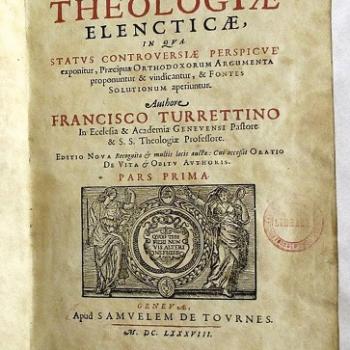
These took place in a combox on anti-theist atheist Jonathan Pearce’s A Tippling Philosopher blog. JMallett‘s words will be in blue, Traveller‘s in green, Geoff Benson‘s in brown, Erp‘s in purple.
*****
[I posted a link to a recent article of mine]: OT & Archaeology: 25 Fascinating Confirmations (“From Noah to Joshua”: the Hebrew Scripture is Extraordinarily Accurate & True to History).
Your blurb reads like a National Enquirer headline, Mr. Spam.
Thanx! If it’s spam, then I’m sure Jonathan will delete it.
Part and parcel of writing is a catchy, descriptive title. Mine is that, and I prove the confident claims in the article itself.
He’s too nice. Would you allow someone to do the same thing on your blog?
Of course. It’s on-topic. The OP claimed: “For Christians, they often start off with the idea of making the Bible say what they want it to say. This underwrites their confirmation bias.”
So I give him 25 arguments from archaeology and science; in other words, independent and external and objective confirmation of the biblical text, which isn’t circular at all.
Not that he’ll ever likely reply, but if he wants to actually seriously interact with a Christian viewpoint regarding this biblical text he is so often obsessed with, the opportunity is always there.
I would not only allow such a thing, but (gasp!!!) interact with it as well, and if it is false, roundly refute it.
Dave, why do you think your arguments are groundbreaking? Have you ever put yourself into the shoes of the Egyptians or any one of the cultures that were not Hebrew? What if you were born an Amalekite? Could your belief just be a product of your surroundings?
I made that exact argument several times in my paper above: the Hebrews drew from surrounding cultures: especially Egyptian. In King Tut’s tomb was found a box very much like the ark of the covenant. The Sinai Covenant was largely drawn in format from existing treaties that were typical of the 13th century BC but not long after, etc. I cite an Egyptologist who wrote three volumes just on that topic alone.
But you guys will never seriously interact with things like that because they are too objective and concrete. You stick with subjective mythology that no one can answer because it’s irrational and arbitrary . . .
It’s not about the seeking of truth here. It’s about making all Christians and Christianity and the Bible (by using relentless straw men) look stupid and idiotic so you can pretend that you have refuted Christianity. That game doesn’t work with me: never has and never will.
I was once a fundie, so you can stop the generalities. We all know that the Hebrews were influenced by the people around them. Yahweh was Baal and El and maybe a few others all rolled into one god. What if you were born an Amalekite? Or born into a Muslim family?
Yep; so many atheists were. I never was.
Then Romans 2 applies if you never heard or understood the gospel:
Romans 2:13-16 (RSV) For it is not the hearers of the law who are righteous before God, but the doers of the law who will be justified. [14] When Gentiles who have not the law do by nature what the law requires, they are a law to themselves, even though they do not have the law. [15] They show that what the law requires is written on their hearts, while their conscience also bears witness and their conflicting thoughts accuse or perhaps excuse them [16] on that day when, according to my gospel, God judges the secrets of men by Christ Jesus.
That’s if you are ignorant. But there are also the obstinate ones who know the truth and reject it. Paul dealt with them in Romans 1:
Romans 1:21-23 for although they knew God they did not honor him as God or give thanks to him, but they became futile in their thinking and their senseless minds were darkened. [22] Claiming to be wise, they became fools, [23] and exchanged the glory of the immortal God for images resembling mortal man or birds or animals or reptiles.
Your choice!
Still just words from a guy who thought Isaiah 42:6-7 was meant for him. Sorry, I’m waiting for a real god to speak for itself. I’ve heard enough of its heralds.
You have to have ears to hear. If you don’t, you won’t. Self-fulfilling prophecy. Jesus speaks loud and clear to those of us who are willing to listen to Him, and follow Him as disciples.
Some humans are just wired to believe.
And some are wired to believe nonsense. “A fool convinced against his will believes the same things still.”
It just means everyone is created equal is load of ……
Do you think people that were once believers but lost their faith are fools? I didn’t ask to stop believing. My faith left me.
It’s silly and simplistic to come up with one explanation for a huge class of people. There are a host of possible reasons, but as I alluded to, generally they come down to one of two broad categories: 1) obstinacy and rebellion or 2) ignorance and having been led astray by false ideas, coupled with an inadequate understanding of the Christianity they rejected, and of the apologetics whereby it can be rationally defended.
This leads to them being slim pickin’s for anti-theist atheists who know all the tricks and methods for talking Christians out of their faith. Thus, those like you who (I think) deny that mere obstinacy is the cause, would, it seems to me, be quite open and willing to have discussions with Christians, to try to be re-convinced of the rationality and superiority of Christianity.
But of course the opposite is the case in every atheist forum I have ever been to. The game is to mock and insult Christians and Christianity, so as to have a false assurance of the supposed vast superiority of atheism. If the latter were indeed the case, then y’all ought to calmly, cordially, rationally refute Christian counter-arguments, rather than merely insult Christians. That’s what people who are confident in their positions and eager to share them with others (share the joy) do. But again, we see the opposite.
Therefore, I suspect that many cases of former Christian atheists are indeed due to obstinacy and rebellion at bottom, because the insulting behavior is the manifestation of it.
But that’s just me speculating based on observation and reason. Only God knows the eternal fate of any given individual, and their heart at any moment of time.
***
Science is the only tool we have for understanding reality. We can use other tools to decide how we live with that reality, but science is the only game in reality town.
Science is the only tool we have for understanding reality.
That statement is not itself science. It’s not even philosophy. It’s simply a bald statement offered without evidence.
Therefore, it must not be “reality.”
Therefore, it’s a false statement.
Ergo, science is not the only tool we have for understanding reality.
But of course this is logic, and you didn’t include that in your litmus test for fields of knowledge that lead us to reality. Is mathematics out the window, too? Science is a philosophy, of course, so you can’t exclude philosophy from the equation, either. You are viciously self-defeating here, any way you look at it.
And it’s blatantly obvious to anyone who isn’t taken in by the epistemological ludicrosity of scientism or science only.
I’d include mathematics as science and I’d argue that logic is science. Long words and flowery phrases aren’t going to change my point.
Neither one is empirical, and both entail axioms to get off the ground. To equate them with science is a non sequitur. They are essential building blocks of science, just as philosophy is, but not the thing itself . . .
***
[E]xplain [to] me then why Genesis does not mention that the Moon has mountains, Venus has phases like the Moon, Jupiter four large moons, Saturn a ring, and the Milky Way is actually formed by countless stars. The kind of stuff that can be guessed with even a very basic telescope.
Explain also why Genesis is right and not for example Hesiod’s Theogony, as this is described by some cosmological theories as the pre-Big Bang state.
Why is Genesis required to mention all those things? Where does such a notion come from? It’s not presenting itself as a science textbook.
The OT does, however, present a remarkable knowledge of germ theory in the Mosaic Law, from the 13th century BC: some 3100 years before modern science figured it out. Why? The last time I brought this up the other person got “bored” and that was the end of that pseudo-discussion. See: The Bible on Germs, Sanitation, & Infectious Diseases.
The Genesis and biblical teaching of creation ex nihilo is backed up by science: Seidensticker Folly #42: Creation “Ex Nihilo”.
***
I note he is copying some of this discussion thread over to a new post on his own channel since he can’t get people to comment there.
Christians (apart from apologists like myself whose job is to refute them) care little about atheist topics. This is news to you? We’re not obsessed with views other than our own; consequently we would never get threads of 770 comments with mostly about ten people commenting over and over. It has nothing to do with trying to get comments. I’m simply recording my public dialogues for the record for future reference on my very extensive Atheism page.
But you guys love to flock together to help make everyone feel all warm and fuzzy and peachy keen about atheism, all comfy-cozy in groupthink bliss, making fun of and savagely caricaturing any outsider who dares enter your sacred bubble, and justifying and rationalizing your (quite frequent) departures from Christianity.
Those of us who converted from Protestant to Catholic went through that phase for a year or two (hobnobbing with other converts) but it was a passing phase. We all want to feel like we’re part of a group that understand us; that we can relate to. But Christians don’t engage in the massive slanderous, mud-throwing avalanches that we observe in atheist forums.
The fact that y’all feel a great need to do that indicates, I think, something important about yourselves (seems to me a great insecurity and lack of conviction). Occasionally (breath of fresh air after the noxious stench!) I observe atheists getting over this phase and no longer being obsessed with mocking and deriding Christians 24-7. They get it, and have passed on from the anti-theist fetish.
So would you have the common courtesy to note that you will be doing so, so people can choose to opt out.
Sure: I will be doing so. All of this is public material. I am all for a free and open exchange of ideas and habitually publish dialogues with everything from both sides (a thing hardly anyone does anymore). I have well over 1000 dialogues on my blog. If someone doesn’t have confidence enough in their position to have it cited on a Christian site, then I suggest they avoid me. Almost all here avoid true dialogue with me, anyway (just as you are doing right now).
Personally I’m not sure which is worst, the Scylla of extreme mythicism of some atheists or the Charybdis of Biblical literalism of some Christians (mostly non-Catholics). Neither group knows much about the field of history.
Perhaps start with a survey of the sources and methodology such as
Grabbe, Lester L. 2007. Ancient Israel: What Do We Know and How Do We Know It? London ; New York: T & T Clark.
I’m not a biblical literalist. I seek to interpret the texts the way they were intended to be interpreted, in light of things like over 200 figures of speech used in Hebrew literature (collected in a huge volume in my library).
If you’re gonna read skeptical commentaries on the Bible, also read the best in scholarship that doesn’t play fashionable theoretical games, but rather, looks at objective, verifiable, external data that backs up the Bible:
Kenneth A. Kitchen (b. 1932), On the Reliability of the Old Testament (Grand Rapids and Cambridge: William B. Eerdmans Publishing Company, 2003)
James K. Hoffmeier (b. 1951), Israel in Egypt: The Evidence for the Authenticity of the Exodus Tradition (Oxford University Press, 1996)
James K. Hoffmeier, Ancient Israel in Sinai: The Evidence for the Authenticity of the Wilderness Tradition (Oxford University Press, 2005)
If you were so confident in your position, you would already be interacting with my article above: which follows this objective methodology; rather than Jonathan’s purely subjective, arbitrary methodology, where mythical schemas imagined in people’s heads for the sake of an agenda are forced onto the Bible. But of course you don’t want to do that! You’d rather crawl over a football field of broken glass first.
***
Photo credit: Kristendawn (9-25-17) [Pixabay / Pixabay License]
***
Summary: I made the point (among other things) at the atheist venue, “A Tippling Philosopher” in an exchange with three atheists, that archaeology is an independent, external verification of the Bible.













